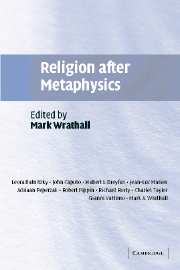Book contents
- Frontmatter
- Contents
- List of contributors
- Preface
- 1 Introduction: metaphysics and onto-theology
- 2 Love and death in Nietzsche
- 3 After onto-theology: philosophy between science and religion
- 4 Anti-clericalism and atheism
- 5 Closed world structures
- 6 Between the earth and the sky: Heidegger on life after the death of God
- 7 Christianity without onto-theology: Kierkegaard's account of the self's movement from despair to bliss
- 8 Religion after onto-theology?
- 9 The experience of God and the axiology of the impossible
- 10 Jewish philosophy after metaphysics
- 11 The “end of metaphysics” as a possibility
- Index
6 - Between the earth and the sky: Heidegger on life after the death of God
Published online by Cambridge University Press: 21 May 2010
- Frontmatter
- Contents
- List of contributors
- Preface
- 1 Introduction: metaphysics and onto-theology
- 2 Love and death in Nietzsche
- 3 After onto-theology: philosophy between science and religion
- 4 Anti-clericalism and atheism
- 5 Closed world structures
- 6 Between the earth and the sky: Heidegger on life after the death of God
- 7 Christianity without onto-theology: Kierkegaard's account of the self's movement from despair to bliss
- 8 Religion after onto-theology?
- 9 The experience of God and the axiology of the impossible
- 10 Jewish philosophy after metaphysics
- 11 The “end of metaphysics” as a possibility
- Index
Summary
In the last decades of his life, Heidegger was preoccupied with the dangers of technology, and tried to articulate a non-technological form of “poetical dwelling” that could save us from those dangers. On Heidegger's account, dwelling consists in achieving a nearness to the earth, the sky, mortals, and divinities.
Viewed with the kind of historical detachment exemplified in Charles Taylor's chapter in this volume, Heidegger's reaction against technology is just one ripple in the “wave of protests” that formed what Taylor calls the “nova effect” – that is, “the multiplication of more and more spiritual and anti-spiritual positions” (see p. above). Such a multiplication, in turn, “further fragilizes any of the positions it contains” in the sense that it undermines the claim of each position to legitimacy. This is because the disagreements between positions are disagreements at the most fundamental levels. As a consequence, Taylor argues, “there is no longer any clear, unambiguous way of drawing the main issue” – the issue at hand being the nature and place of religion in a post-metaphysical, technological age.
Taylor's observations are valuable as a reminder that Heidegger's diagnosis of our age is itself couched in terms that are not only contestable from a number of sides, but perhaps almost unintelligible to other splinter positions in the overall fragmentation of modern culture.
- Type
- Chapter
- Information
- Religion after Metaphysics , pp. 69 - 87Publisher: Cambridge University PressPrint publication year: 2003
- 2
- Cited by



